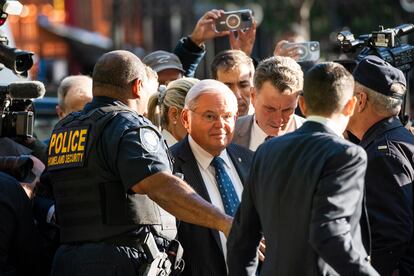Democratic Sen. Bob Menendez pleads not guilty to pocketing bribes in a wide-ranging corruption case
More than half of Senate Democrats have now said that Menendez should resign, including fellow New Jersey Sen. Cory Booker

U.S. Sen. Bob Menendez of New Jersey pleaded not guilty on Wednesday to federal charges accusing him of pocketing bribes of cash and gold bars in exchange for wielding his political influence to secretly advance Egyptian interests and do favors for local businessmen.
Menendez made his initial court appearance in Manhattan’s federal court days after prosecutors unsealed an indictment alleging vast corruption by the Democrat, who was forced to step down as chairman of the powerful Senate Foreign Relations Committee after being indicted. A lawyer entered the not guilty plea on his behalf.
Menendez was ordered released on a $100,000 bond, and he must surrender any personal passports but will be allowed to keep an official passport that would allow him to travel outside the U.S. for government business. The judge ordered him not to have any contact with his co-defendants except for his wife. He also can’t have contact with Senate staffers who know about the facts of the case outside of the presence of lawyers.
A defiant Menendez has said allegations that he abused his power to line his pockets are baseless. He has said he is confident he will be exonerated and has no intention of leaving the Senate.
Still, calls for Menendez to resign continued to mount on Wednesday, with Illinois Sen. Dick Durbin, the No. 2 Senate Democrat, saying “he should step down.” More than half of Senate Democrats have now said that Menendez should resign, including fellow New Jersey Sen. Cory Booker, who said the indictment includes “shocking allegations of corruption and specific, disturbing details of wrongdoing.”
It’s the second corruption case in a decade against Menendez, whose last trial involving different allegations ended with jurors failing to reach a verdict in 2017.
Authorities say they found nearly $500,000 in cash, much of it hidden in clothing and closets, as well as more than $100,000 in gold bars in a search of the New Jersey home Menendez, 69, shares with his wife.
Charged alongside Menendez is his wife, Nadine, who prosecutors say played a key role in collecting hundreds of thousands of dollars worth of bribes from three New Jersey businessmen seeking help from the longtime lawmaker. An attorney for Nadine Menendez entered a not guilty plea for her on Wednesday.
Prosecutors allege repeated actions by Menendez to benefit the authoritarian government of Egypt. They say Menendez also tried to interfere in criminal investigations involving associates, in one case pushing to install in New Jersey a federal prosecutor who he believed he could influence to derail a case.
Two of the businessmen, Jose Uribe and Fred Daibes, also were arraigned and pleaded not guilty. The third, Wael Hana, pleaded not guilty on Tuesday to charges including conspiracy to commit bribery. Hana was arrested at Kennedy Airport on Tuesday after returning voluntarily from Egypt to face the charges, and he was ordered freed pending trial.
Menendez, in his first public remarks after last week’s indictment, said on Monday that the cash found in his home was drawn from his personal savings accounts over the years and that he kept it on hand for emergencies.
One of the envelopes full of cash found at his home, however, bore Daibes’ DNA and was marked with the real estate developer’s return address, according to prosecutors.
Prosecutors said Hana promised to put Menendez’s wife on his company’s payroll in a low- or no-show job in exchange for Menendez using his influential post to facilitate foreign military sales and financing to Egypt. Prosecutors allege Hana also paid $23,000 toward her home mortgage, wrote $30,000 checks to her consulting company, promised her envelopes of cash, sent her exercise equipment and bought some of the gold bars that were found in the couple’s home.
The indictment alleges repeated actions by Menendez to benefit Egypt, despite U.S. government misgivings over the country’s human rights record that in recent years have prompted Congress to attach restrictions on aid.
Prosecutors, who detailed meetings and dinners between Menendez and Egyptian officials, say Menendez gave sensitive U.S. government information to Egyptian officials and ghostwrote a letter to fellow senators encouraging them to lift a hold on $300 million in aid to Egypt, one of the top recipients of U.S. military support.
Prosecutors have accused Menendez of pressuring a U.S. agricultural official to stop opposing a lucrative deal that gave Hana’s company a monopoly over certifying that imported meat met religious standards.
Sign up for our weekly newsletter to get more English-language news coverage from EL PAÍS USA Edition
Tu suscripción se está usando en otro dispositivo
¿Quieres añadir otro usuario a tu suscripción?
Si continúas leyendo en este dispositivo, no se podrá leer en el otro.
FlechaTu suscripción se está usando en otro dispositivo y solo puedes acceder a EL PAÍS desde un dispositivo a la vez.
Si quieres compartir tu cuenta, cambia tu suscripción a la modalidad Premium, así podrás añadir otro usuario. Cada uno accederá con su propia cuenta de email, lo que os permitirá personalizar vuestra experiencia en EL PAÍS.
¿Tienes una suscripción de empresa? Accede aquí para contratar más cuentas.
En el caso de no saber quién está usando tu cuenta, te recomendamos cambiar tu contraseña aquí.
Si decides continuar compartiendo tu cuenta, este mensaje se mostrará en tu dispositivo y en el de la otra persona que está usando tu cuenta de forma indefinida, afectando a tu experiencia de lectura. Puedes consultar aquí los términos y condiciones de la suscripción digital.








































